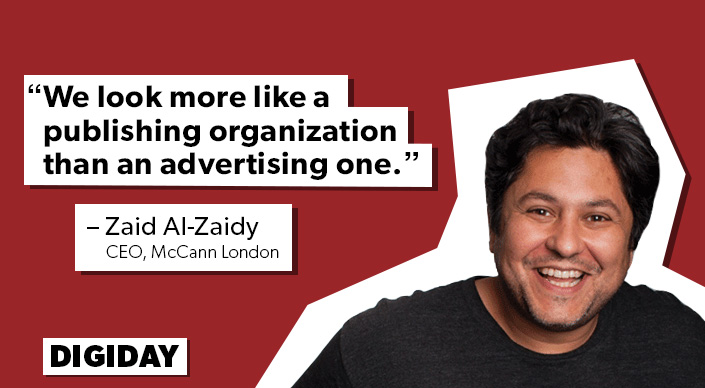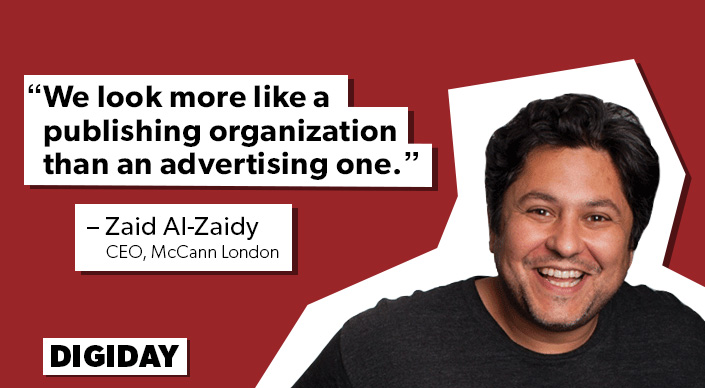
This is “View from the Top,” the latest in a Digiday series featuring creative leaders talking about their career paths and leadership perspectives. Read previous interviews here.
Since joining McCann London last May from TWBA London, Zaid Al-Zaidy has risen quickly up the ranks, going from chief strategy officer to CEO in the space of five months. Now just over a year into the top job, Al-Zaidy has had to help recast the agency to compete with newer, more nimble digital shops.
Interpublic Group-owned McCann London has had a hot streak of account wins lately, picking up Microsoft’s creative brief and topping Campaign’s new business league table. Its Friend Compass app for flight comparison site Momondo has also helped show the agency isn’t just a producer of clever TV spots, but digital applications too.
For his part Al-Zaidy, who initially dreamed of being an international art dealer, got his first taste of the industry at Unilever as a marketing trainee. After 8 years on the client side, he stepped into the agency world with Mother, then RKCR/Y&R, Saint Digital and TBWA\London. Here, Al-Zaidy gives us his thoughts on turning a big agency around and keeping things fun.
What was the challenge you had when taking over?
We suffered a little bit from the “big effect” — the perception of being slow, old-fashioned and not as digitally enabled. But actually, being big provides the ability to scale up technology very fast. We had a bit of a reputation issue so really we’ve just had to dial up the positive things that have always been there and accelerate their growth. We were slightly slow, but that gave us a chance to learn from everyone else who’s made a mess of it.
How has McCann London changed since then?
We’re in the content business essentially. We look more like a publishing organization than an advertising one. The big difference has been that advertising people generally make a lot of stuff, but infrequently. Whereas publishing companies make stuff all the time. We’re definitely moving into the live, always-on world.

Everybody says they can create content though.
Why can’t ad agencies do content? Because they can’t do the comms and analytics. Why can’t media agencies do it? Because they don’t have the ideas. When it comes to our content offering, I think we’ve had the luxury of arriving late and seeing where others have made a mess of it. We’ve assembled a different set of skills to create a really unique team.
Is it lonely being an agency CEO?
Running an agency is meant to be a very lonely thing but actually we have a very tight team. I work very closely with my co-presidents and chief creative officers Rob and Lolly. We sit together over a big table and we’ve got a shared vision. The big challenge which I was told you face as a CEO is balancing the short term and the long term. Meeting the requirements of the business and creating at the speed of culture, whilst ensuring that you’re building the foundations for long term success. What we try and do is provide a free culture: people can do what they want to do; there’s beer here if people want to work late; no one bollocks them for coming in late.
Are you still having fun?
It’s an amazing industry to be in because it’s problem solving through creativity — it’s both a “proper job” and not a “proper job”. That’s a perfect blend, because it helps you balance being an independent, free-thinker while accepting the responsibilities of growing up. Even though I run a very serious business, we have great fun working out ways to solve business problems. Sure, working for Nike, Apple or Google is desirable, but the whole gymnastics around having twenty or thirty different types of brands to work on makes work much more colorful.
More in Marketing

YouTube’s upmarket TV push still runs on mid-funnel DNA
YouTube is balancing wanting to be premium TV, the short-form powerhouse and a creator economy engine all at once.

Digiday ranks the best and worst Super Bowl 2026 ads
Now that the dust has settled, it’s time to reflect on the best and worst commercials from Super Bowl 2026.

In the age of AI content, The Super Bowl felt old-fashioned
The Super Bowl is one of the last places where brands are reminded that cultural likeness is easy but shared experience is earned.





